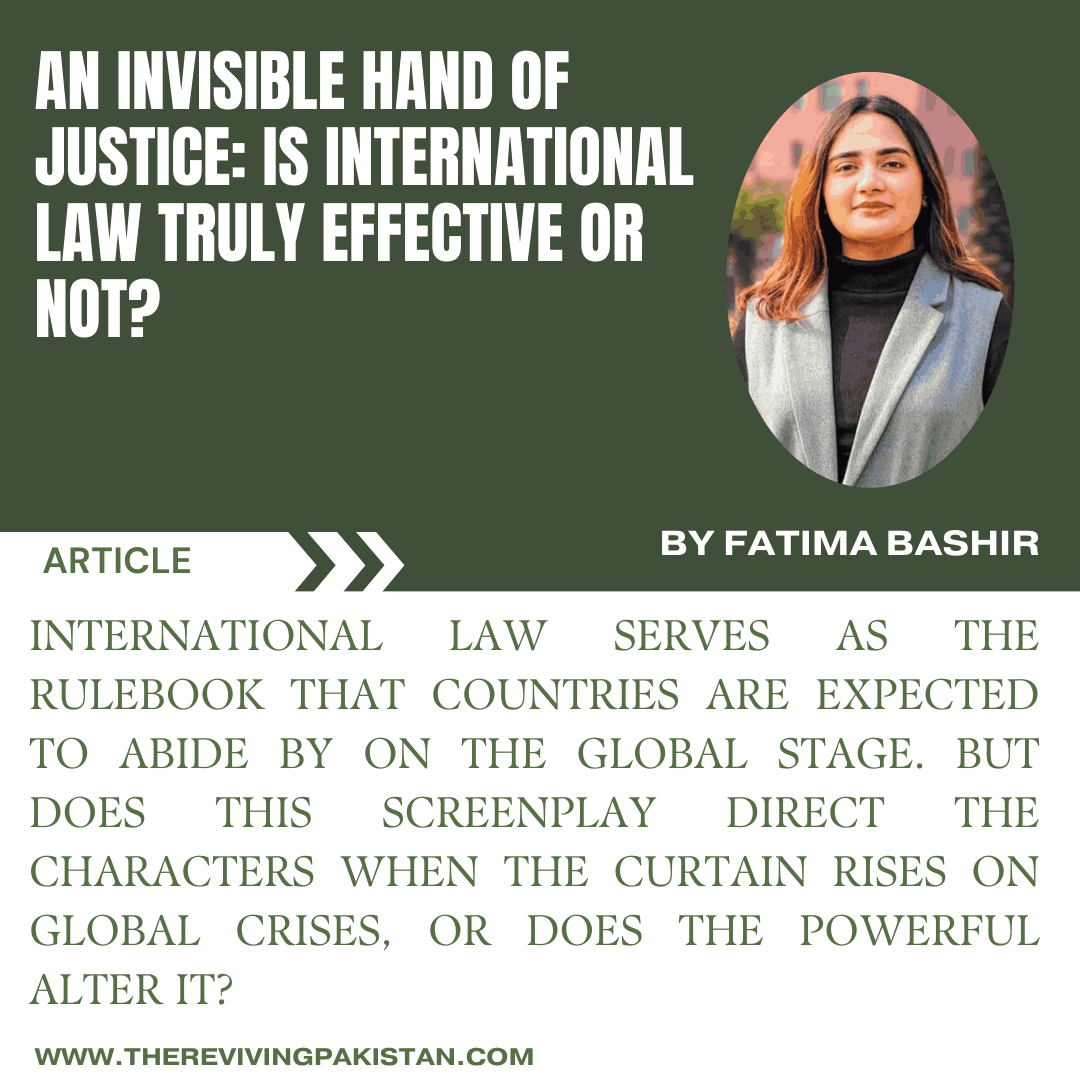About the Author(s)

Fatima Bashir
The author is a student of International Relations at the University of Central Punjab, with a passion for law, politics, and staying up-to-date on current events. She is dedicated to exploring the connections between global issues and their impact on our world.
International law serves as the rulebook that countries are expected to abide by on the global stage. But does this screenplay direct the characters when the curtain rises on global crises, or does the powerful alter it? Is international law genuinely able to steer the discourse on human rights, peacekeeping, and international governance, or is it merely an embellishment that can be readily disregarded when national interests take precedence? In order to understand it’s current state, let’s examine how international law has developed over time to address pressing needs.
HOW INTERNATIONAL LAW DEVELOPED OVERTIME?
To understand how international law shaped global discourse lets explore how it evolved over time. The roots of international law stretch back thousands of years with agreement and treaties dating to ancient civilizations. The TREATY OF MESILIM (2100 BC) is the oldest recorded treaty in human history. It settled a boundary dispute between the neighboring
Mesopotamian states of Uma and Lagash on the banks of the River Tigris, close to the Persian Gulf. Then, several other accords among the Greeks, Romans, Indians, Chinese and the Middle Eastern countries happened . International commerce law developed during the Middle Ages, encompassing both maritime and mercantile law. Since these rules dealt with international situations, they were seen as the forerunners of international law. The Treaty of Westphalia, which put an end to the 30-year conflict that had started in the Holy Roman Empire in 1618, was a pivotal moment in the evolution of international law. Following this, Central Europe witnessed the emergence of a peaceful political system centered on the peaceful coexistence of sovereign states. However, international law faced a serious threat in the aftermath of the World Wars. The collapse of the League of Nations in 1939 and the outbreak of World War II shocked the international community. As hostilities ceased in 1945, major challenges arose, including border adjustments, refugee treatment, and the admission of new states to the international community. Following World War II, international law became much more significant. When the big problems that I’ve mentioned earlier, were plaguing the world. International treaty creation, interpretation, and enforcement procedures were formalized in the Vienna Convention on the Law of Treaties in 1969. That’s how international law formally developed overtime because there was need of it.
AN UNSEEN FORCE:
International law is basically an invisible hand that regulates the behavior of states. But is it truly effective? When we witness Genocide cases like that of Palestine (Gaza) it seems as though international law is useless, as every state has it’s own Will and they can decide whether they want to follow international law or not. However, on the other hand, we’ve seen states descend into chaos and even obliteration, in the absence of international law or international organizations mandates. International law shapes state’s behavior, even if not always enforced. Geneva Conventions are one the key players in this regard. The Universal declaration of human rights 1948 provides global rules and regulations for human rights. International criminal court (ICC) and International court of justice (ICJ) are one of the strongest pillars of international law that shapes the state behavior. During the 1980s, Nicaragua’s communist government confronted resistance from the US-upheld Contra rebels. The US gave military guide to the Contras, which Nicaragua guaranteed was an infringement of global regulation. In 1986, Nicaragua won its appeal to the International Court of Justice (ICJ). Nicaragua argued that US support for the Contras was against the UN Charter and the principle of non-intervention. The US contended that its activities were legitimate as self-protection against Nicaragua’s supposed help for liberal agitators in El Salvador. The ICJ dismissed the US contention, observing that its activities were unlawful and requesting the US to stop its help for the Contras. Nicaragua and the Contras eventually began peace talks after the ruling resulted in a ceasefire.
During the civil war in the Democratic Republic of the Congo, Thomas
Lubanga was a warlord from Congo who was in charge of the Union of Congolese Patriots (UPC) militia. He was accused of committing war crimes and recruiting child soldiers. Lubanga was tried by the International Criminal Court (ICC), and he was found guilty in 2012.
However, there is an issue with international tribunals and courts jurisdiction as well. A country may pass national laws that claim exclusive authority over certain issue, even if those issues are regulated by
international law. An illustration of this is The “American Service-Members’ Protection Act” (ASPA), which was approved by the US in 2002. It had a clause that forbade US collaboration with the International Criminal Court (ICC) and gave the president the right to use military action to liberate US citizens or allies detained by the ICC. The US had ratified the ICC treaty in 2000, yet this statute reaffirmed US sovereignty over its people and military members. ASPA sparked widespread outrage and was perceived by some as a breach of international law, challenging the ICC’s jurisdiction. This case shows how national laws can contend with international law’s jurisdiction over subjects covered by it, leading to disputes and tensions.
UNITED NATIONS:
Currently, United Nations is the most important institution, when it comes to resolution of international disputes. However, it’s effectiveness has also been questioned. presence of permanent five (P5) members in Security Council has led to skepticism about united nations effectiveness, as it is perceived to prioritize these powerful nations over those of other. The UN Security Council has vetoed over 256 resolutions since 1946. The winning Allied powers ( P5) are no longer the sole powerful nations on the global stage, as many nations have eclipsed them economic and military prowess This shift has sparked debates about reshaping the structure of security Council to bolster its effectiveness as it is the most important organ of United nations.
DISCRETION OF THE STATES:
The framework provided by International law, in the absence of a global government, is not binding on all states. International law basically relies on 3 key elements : International pressure, sanctions and Cooperation. These are effective to some extent but, States have the discretion to chose which treaty they sign and ratify, as well as which clauses they will follow, it’s up to them., despite the International pressure, states can chose what is best for them . Numerous examples illustrate this Phenomenon:
Russia’s annexation of Crimea (2014) was the violation of international law and Helsinki final act. But they still justified it claiming that it was under the principle of self determination. Similarly, USA’s invasion of Iraq in 2003 was also a violation of international law as the UN Security Council did not authorize it.
IS IT EFFECTIVE OR NOT?
International law is a complex and multifaceted system, that has both resolved conflicts and exacerbated them. While it has many beneficial attributes, it has many shortcomings which makes it ineffective most of the times. The primary reasons for this is the non- binding nature of international law ,prioritization of state’s national interests. International institutions often respond slowly to rising issues, and even when they do the implementation of united nations resolutions is frequently delayed further diminishing the effectiveness of international law. The contradiction of national laws with international law, and the interest of powerful states, makes it difficult for the international law to function properly. To enhance the effectiveness of international law , it is crucial to address it’s shortcomings, and strengthen enforcement mechanisms.

